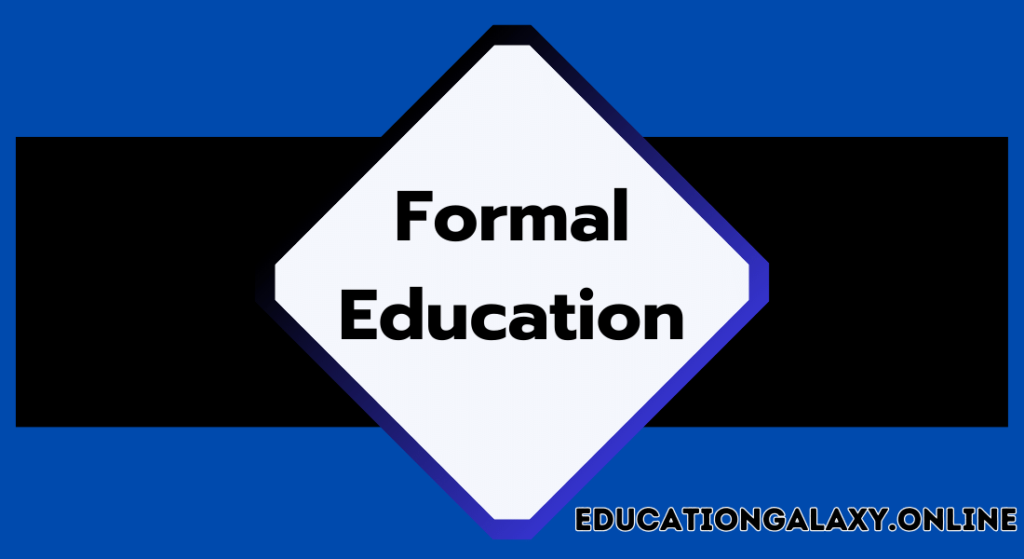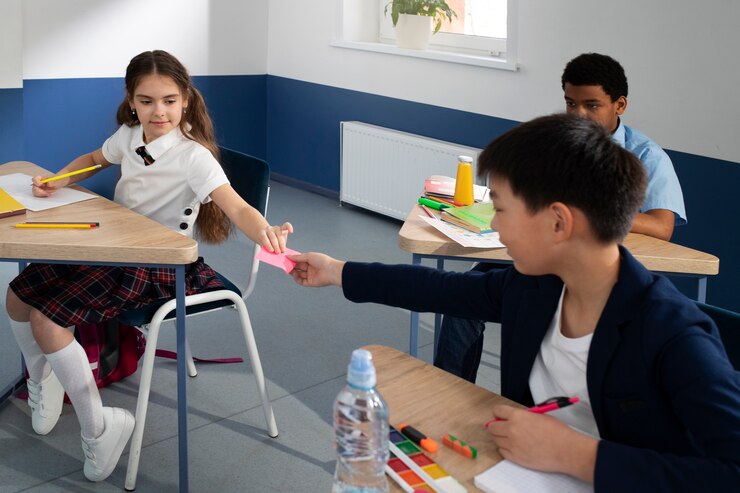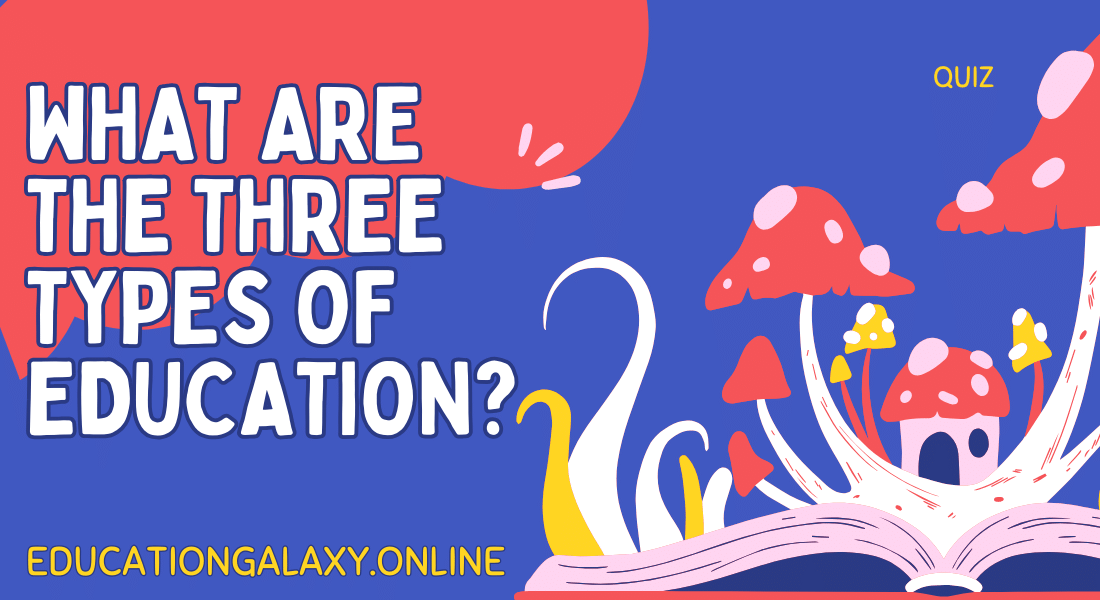Introduction:
Education is a fundamental aspect of our lives, shaping our knowledge, skills, and understanding of the world. As we navigate the diverse landscape of educational opportunities, it is essential to recognize the various types of education. From formal institutions to informal learning experiences, education takes on different forms and serves distinct purposes. This article will explore the three main types of education: formal, non-formal, and informal. By understanding the characteristics and distinctions of each type, we can appreciate the multifaceted nature of education and its profound impact on individuals and society as a whole. Let us delve into education to unravel the intricacies of these three essential pillars of Learning.
Read Must Articles:
How Good Is Our Early Learning and Childcare?
How Culture Affects Education: A Comprehensive Guide for Educators
What Is Post-Secondary Education: A Multifaceted Exploration
Edustaff Login: Empowering Educational Excellence Through Enhanced Workflows and Communication
What are the three types of education?
Education is the process of facilitating Learning or the acquisition of knowledge, skills, values, beliefs, and habits. It can take place in formal, non-formal, and informal settings.
Formal education
Formal education is a structured and intentional form of Learning that typically occurs within an educational institution, such as a school, college, or university. It is characterized by a defined curriculum, certified teachers, and a schedule of classes. Formal education typically leads to awarding a degree, diploma, or certificate upon completion.
Characteristics of formal education:
- Structured curriculum: Formal education follows a predetermined curriculum that outlines the subjects, topics, and skills to be covered. This curriculum is designed to ensure that students acquire a well-rounded and systematic education.
- Certified teachers: Formal education is imparted by certified teachers with specialized knowledge and skills in their respective subjects. These teachers are responsible for delivering the curriculum, assessing student progress, and providing guidance and support.
- Schedule of classes: Formal education takes place according to a fixed schedule of classes. Students are expected to attend classes regularly and participate in scheduled activities, such as lectures, discussions, and assignments.
- Assessment and certification: Formal education involves regular assessment of student learning through tests, exams, and assignments. Upon completing the program, students are awarded a degree, diploma, or certificate that recognizes their achievements and qualifies them for further education or employment.
Examples of formal education:
- Primary and secondary school
- College and university
- Vocational and technical training
- Graduate and postgraduate studies
Advantages of formal education:
- Structured and systematic: Formal education provides a structured and systematic approach to Learning, ensuring that students cover a comprehensive range of subjects and skills.
- Certified teachers: Students benefit from the expertise and guidance of certified teachers trained to deliver the curriculum effectively.
- Credentials and qualifications: Formal education leads to awarding degrees, diplomas, or certificates that employers and educational institutions recognize. These credentials can enhance career prospects and open up opportunities for further education.
- Socialization and networking: Formal education provides opportunities for students to interact with peers, teachers, and professionals in their field, fostering socialization and networking.
Disadvantages of formal education:
- Rigidity: Formal education can sometimes be rigid and inflexible, with limited scope for customization or individualization.
- Cost: Formal education can be expensive, especially at higher levels such as college and university.
- Time commitment: Formal education requires a significant time commitment. Students are expected to attend classes regularly and complete assignments and projects outside of class hours.
- May not always align with career goals: Formal education may only sometimes provide the specific skills and knowledge required for certain careers or professions.
Formal education is crucial in providing individuals with solid knowledge, skills, and qualifications. It is particularly suited for individuals who seek structured learning environments, recognized credentials, and the opportunity to pursue higher education or specialized careers.
Non-Formal Education
Non-formal education refers to organized educational activities outside the formal education system. It is typically designed to provide specific skills or knowledge for personal development, career advancement, or community engagement. Various providers can offer non-formal education, including community organizations, non-governmental organizations (NGOs), businesses, and government agencies.
Characteristics of Non-Formal Education:
- Flexibility: Non-formal education is flexible and adaptable to learners’ needs. It can be tailored to specific target groups, learning objectives, and schedules.
- Practical focus: Non-formal education often emphasizes practical skills and knowledge that can be directly applied to the workplace or community.
- Variety of providers: Non-formal education is offered by various providers, including community groups, NGOs, businesses, and government agencies. This allows learners to access a wide range of learning opportunities.
- Non-accredited: Non-formal education typically does not lead to formal certification or accreditation. However, it may be recognized by employers or other organizations for specific purposes.
Examples of Non-Formal Education:
- Job training programs
- Workshops and seminars
- Community education classes
- Online courses
- Mentoring and coaching programs
Advantages of Non-Formal Education:
- Flexibility: Non-formal education offers flexibility in scheduling, location, and pace of Learning.
- Practical skills: Non-formal education focuses on developing practical skills and knowledge that can be immediately applied in the workplace or community.
- Accessibility: Non-formal education is often more accessible than formal education, particularly for individuals who may not have the time or resources for traditional schooling.
- Cost-effective: Non-formal education can be more cost-effective than formal education, especially for short-term or specialized programs.
Disadvantages of Non-Formal Education:
- Lack of recognition: Formal education may be more widely recognized than formal education, which can limit its value in specific job markets or for further education.
- Quality control: The quality of non-formal education programs can vary widely, as there is less regulation than formal education.
- Limited progression pathways: Non-formal education may only sometimes provide clear pathways for progression to higher levels of education or specialized careers.
Non-formal education is vital in providing individuals with opportunities to develop specific skills and knowledge. It is particularly suited for individuals who seek flexible learning options, practical training, and personal enrichment.
Informal Education
Informal education refers to the lifelong process of acquiring knowledge, skills, and values through daily experiences and interactions outside formal or non-formal educational settings. It occurs naturally through everyday activities, social interactions, and self-directed Learning. Informal education is often unintentional and may need to be recognized or certified.
Characteristics of Informal Education:
Unstructured: Informal education is independent of a structured curriculum or schedule. It happens spontaneously and incidentally.
Lifelong process: Informal education occurs throughout an individual’s life, from childhood to adulthood.
Experiential: Informal education involves hands-on experiences, observations, and interactions with the environment and others.
Self-directed: Individuals often engage in informal education out of personal interest or curiosity without external guidance or assessment.
Examples of Informal Education:
- Learning from family and friends
- Reading books and articles
- Exploring hobbies and interests
- Interacting with nature
- Traveling and experiencing different cultures
Advantages of Informal Education:
Flexibility: Informal education allows individuals to learn at their own pace and on their terms.
Accessibility: It is open to everyone, regardless of age, background, or location.
Practicality: Informal education often involves learning skills and knowledge that can be directly applied to everyday life.
Enjoyable: Informal education is often driven by personal interest and curiosity, making it a pleasant experience.
Disadvantages of Informal Education:
Lack of structure: The unstructured nature of informal education can make tracking progress or measuring outcomes challenging.
Limited recognition: Informal education may not be recognized or valued in formal education or employment settings.
Potential for misinformation: With proper guidance, individuals may acquire accurate and biased information through informal education.
Informal education plays a crucial role in shaping individuals’ knowledge, skills, and values. It complements formal and non-formal education by providing opportunities for lifelong Learning, personal growth, and the development of practical life skills.
Examples:
- Children learn to ride bikes by observing and practicing with their parents.
- An adult learning about gardening through trial and error in their backyard.
- A person developing their cooking skills by watching cooking shows and experimenting with recipes at home.
- Informal education is an essential component of lifelong Learning and personal development, empowering individuals to acquire knowledge and skills continuously throughout their lives.
All three types of education are essential and can play a vital role in personal and professional development. Formal education provides the foundation for many careers and can lead to higher earnings. Non-formal education can help individuals develop specific skills or knowledge that can be applied to their work or personal lives. Informal education can help individuals learn new things and expand their knowledge and skills.
Conclusion
Education encompasses a diverse spectrum of experiences and opportunities, ranging from formal to non-formal and informal settings. Formal education provides a structured and accredited path to knowledge acquisition, preparing individuals for specialized careers and higher education. Non-formal education offers flexibility and practical skills development, catering to specific needs and career advancement. Informal education, which occurs throughout our lives through daily interactions and experiences, enriches our understanding of the world and fosters personal growth.
Each type of education plays a vital role in shaping individuals and society. Formal education lays the foundation for academic achievement and professional success. Non-formal education empowers individuals with practical skills and knowledge, enhancing their employability and adaptability to changing job markets. Informal education promotes lifelong Learning, personal enrichment, and the development of essential life skills.
Recognizing the value and interconnectedness of these three types of education enables us to create a comprehensive and inclusive educational landscape that meets the diverse needs of learners. By embracing formal, non-formal, and informal education, we empower individuals to become well-rounded, adaptable, and lifelong learners, capable of navigating the complexities of the modern world and contributing meaningfully to society.


